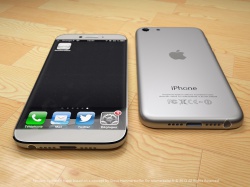Apple has used several materials in its iPhones over the years, from metal to plastic to a metal-and-glass combination and then metal again. And it seems that the company will use a whole new material for its upcoming smartphones - Liquidmetal alloys.
The iPhone maker had signed a deal in 2010 with Liquidmetal Technologies, a company that works in the field of amorphous metal alloys. Despite the agreement between the two companies, however, the alloy has not been used in any Apple model so far. Apple reportedly used this alloy in the sim card ejector tool of iPhone 3G, but there has been no word on its application in any other device until now.
The alloy produced by Liquidmetal is known for properties like high strength and resistance to corrosion.
Apple has filed patents for 17 applications of the Liquidmetal alloy, sparking speculation that the material will be used in future iPhones. While most of the applications of the material are technical in nature, three of them are likely to be used in upcoming models, provided patents for the same are granted to Apple.
The company has proposed using the Liquidmetal alloy as a substrate for touch sensors used in the screens of iOS devices. Apple's patent filing talks about using the material to ensure more accurate touch sensing on the display panel.
Another application for the material is in pressure sensors, which are used in buttons in smartphones (in Apple's case, the Home button). With the Liquidmetal alloy, the Home button would become more durable and withstand repeated use longer.
The third major application of Liquidmetal alloy can be in the screws used to secure iPhones' body. The material can be used to create tamper-resistant screws, thus stopping third-party vendors from opening the handset.
Apple's patent filing says, "A proposed solution according to embodiments herein for tamper resistance is a fastener having a head portion and a tamper resistant bulk-solidifying amorphous alloy interlock portion, wherein the fastener and the substrate into which the fastener is fitted into are permanently fastened via an interlock formed from the interlock portion during the fastening process."
However, Liquidmetal alloy is not the only material that Apple plans to use in its upcoming products. The company has been granted patent for a flexible display made out of sapphire, the same material that it uses in the Touch ID fingerprint sensor.







Comments